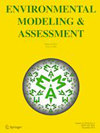There is a growing interest in the field of modeling and quantitative assessment of environmental problems. For some years now results of environmental models and assessment analyses have been influencing environmental regulation and policies at local national and international levels. Therefore the need to understand both the power and limitations of environmental models and quantitative assessment techniques has never been greater. The journal aims to build a bridge between the scientific community's understanding of key environmental issues and the decision makers' need to influence relevant policies and regulations on the basis of the best available information. Environmental Modeling & Assessment strives to achieve this by publishing high quality papers that may be regarded as either instances of best practice or as studies that advance the evolution and applicability of the theories and techniques of modeling and assessment. Consequently Environmental Modeling & Assessment will publish high quality papers on all aspects of environmental problems that contain a significant quantitative modeling or analytic component interpreted broadly. In particular we are interested both in detailed scientific models of specific environmental problems and in large scale models of the global environment. We invite models of environmental problems and phenomena that utilise in an original way the techniques of ordinary and partial differential equations simulation statistics and applied probability control theory operations research mathematical economics and game theory. Emphasis will be placed on the novelty of the model the environmental relevance of the problem and the generic applicability of the techniques used. Generally papers should be written in a manner that is accessible to a wide interdisciplinary audience. However Environmental Modeling & Assessment will also provide a forum where researchers can publish a complete mathematical description of important environmental models together with the accompanying analysis and underlying assumptions. Occasionally papers that are primarily theoretical will be accepted provided that the results deliver conceptual insight into some environmental problem.
